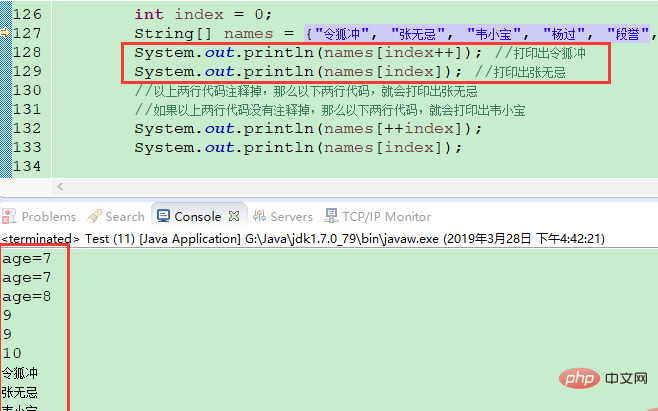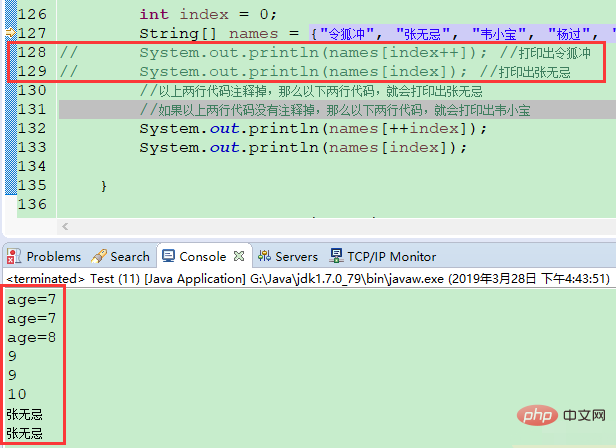 Java
Java
 javaTutorial
javaTutorial
 The difference between pre++ and post++ in java (detailed explanation with pictures and text)
The difference between pre++ and post++ in java (detailed explanation with pictures and text)
The difference between pre++ and post++ in java (detailed explanation with pictures and text)

The difference between front and back in java (detailed picture and text explanation)
Preceding in java After adding and adding, many people are confused and don’t quite understand! Today I will give you a few examples to illustrate the difference between front and back!
In fact, you only need to remember one sentence. Before , you need to add it first and then use ; while after , you need to use it first and then add it yourself!
Before and after summary: In fact, everyone only needs to remember one sentence, before First add it yourself and then use it, then use it first and then add it yourself!
Please look at the example below to understand!
public class Test {
public static void main(String[] args) {
//测试,前加加和后加加
//前++和后++总结:其实大家只要记住一句话就可以了,前++是先自加再使用而后++是先使用再自加!
int age = 6;
//先自加,再使用(age先自加1,然后再打印age=7,此时age的值在内存中是7)
System.out.println("age=" + ++age);
//先使用,再自加(此时age的值在内存中是7,先打印age=7,然后age再自加1,所以此时打印age=7,但是其实此时age的值在内存中已经是8了)
System.out.println("age=" + age++);
//此时打印出来age=8
System.out.println("age=" + age);
//先自加,再使用(此时age在内存中的值是8,先自加1,age的值在内存中就变成了9,然后再打印age,所以此时打印出9)
System.out.println(++age);
//先使用,再自加(此时age在内存中的值是9,先打印出9,然后age再自加1,自加完后,此时age在内存中的值是10)
System.out.println(age++);
//此时打印age是10
System.out.println(age);
int index = 0;
String[] names = {"令狐冲", "张无忌", "韦小宝", "杨过", "段誉", "乔峰"};
// System.out.println(names[index++]); //打印出令狐冲
// System.out.println(names[index]); //打印出张无忌
//以上两行代码注释掉,那么以下两行代码,就会打印出张无忌
//如果以上两行代码没有注释掉,那么以下两行代码,就会打印出韦小宝
System.out.println(names[++index]); //打印出张无忌
System.out.println(names[index]); //打印出张无忌
}
}


Thank you all for reading, I hope you all The benefits are many.
This article is reproduced from: https://blog.csdn.net/czh500/article/details/79665981
Recommended tutorial: "java tutorial"
The above is the detailed content of The difference between pre++ and post++ in java (detailed explanation with pictures and text). For more information, please follow other related articles on the PHP Chinese website!

Hot AI Tools

Undresser.AI Undress
AI-powered app for creating realistic nude photos

AI Clothes Remover
Online AI tool for removing clothes from photos.

Undress AI Tool
Undress images for free

Clothoff.io
AI clothes remover

AI Hentai Generator
Generate AI Hentai for free.

Hot Article

Hot Tools

Notepad++7.3.1
Easy-to-use and free code editor

SublimeText3 Chinese version
Chinese version, very easy to use

Zend Studio 13.0.1
Powerful PHP integrated development environment

Dreamweaver CS6
Visual web development tools

SublimeText3 Mac version
God-level code editing software (SublimeText3)

Hot Topics
 Square Root in Java
Aug 30, 2024 pm 04:26 PM
Square Root in Java
Aug 30, 2024 pm 04:26 PM
Guide to Square Root in Java. Here we discuss how Square Root works in Java with example and its code implementation respectively.
 Perfect Number in Java
Aug 30, 2024 pm 04:28 PM
Perfect Number in Java
Aug 30, 2024 pm 04:28 PM
Guide to Perfect Number in Java. Here we discuss the Definition, How to check Perfect number in Java?, examples with code implementation.
 Random Number Generator in Java
Aug 30, 2024 pm 04:27 PM
Random Number Generator in Java
Aug 30, 2024 pm 04:27 PM
Guide to Random Number Generator in Java. Here we discuss Functions in Java with examples and two different Generators with ther examples.
 Weka in Java
Aug 30, 2024 pm 04:28 PM
Weka in Java
Aug 30, 2024 pm 04:28 PM
Guide to Weka in Java. Here we discuss the Introduction, how to use weka java, the type of platform, and advantages with examples.
 Armstrong Number in Java
Aug 30, 2024 pm 04:26 PM
Armstrong Number in Java
Aug 30, 2024 pm 04:26 PM
Guide to the Armstrong Number in Java. Here we discuss an introduction to Armstrong's number in java along with some of the code.
 Smith Number in Java
Aug 30, 2024 pm 04:28 PM
Smith Number in Java
Aug 30, 2024 pm 04:28 PM
Guide to Smith Number in Java. Here we discuss the Definition, How to check smith number in Java? example with code implementation.
 Java Spring Interview Questions
Aug 30, 2024 pm 04:29 PM
Java Spring Interview Questions
Aug 30, 2024 pm 04:29 PM
In this article, we have kept the most asked Java Spring Interview Questions with their detailed answers. So that you can crack the interview.
 Break or return from Java 8 stream forEach?
Feb 07, 2025 pm 12:09 PM
Break or return from Java 8 stream forEach?
Feb 07, 2025 pm 12:09 PM
Java 8 introduces the Stream API, providing a powerful and expressive way to process data collections. However, a common question when using Stream is: How to break or return from a forEach operation? Traditional loops allow for early interruption or return, but Stream's forEach method does not directly support this method. This article will explain the reasons and explore alternative methods for implementing premature termination in Stream processing systems. Further reading: Java Stream API improvements Understand Stream forEach The forEach method is a terminal operation that performs one operation on each element in the Stream. Its design intention is





